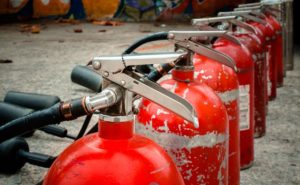
Fire extinguishers prevent a small fire from becoming a widespread, life-threatening entity.
It’s common knowledge that fire extinguishers help save lives. They can prevent a small fire from becoming a widespread, life-threatening entity. Using the wrong fire extinguisher, just as much as not using one at all, is dangerous. Today we’re going to provide a guide on what types of fire extinguishers exist and how they function.
What Are The Five Main Types of Fire Extinguishers?
- Water
- Foam
- Dry
- Powder
- CO2
- Wet Chemical
The classes of fire that are indicative of the industry that you work in will determine what kind of fire extinguisher you need. For example, if you work in the restaurant industry and a grease fire occurs, then you’ll need a type B or wet chemical fire extinguisher to put out the flame. Water does not put out grease fires. The phrase “water and oil don’t mix” is prevalent for a reason. One class of a fire extinguisher won’t put out all types of fires. That’s why it’s vital to understand your industry.
What Are the Classes of Fire?
- Class A– combustible solids such as wood, paper, and fabric
- Class B– flammable liquids such as petrol or paint
- Class C– flammable gases like methane and hydrogen
- Class D– Combustible metals such as magnesium, potassium, and aluminum
- Electrical – Electrical equipment
- Class F– Grease or cooking oil
What Class of Fire Extinguishers Work With Each Class of Fire?
You can only use a water fire extinguisher to put out Class A fires. Water will only extinguish solids such as wood, paper, and fabric. Foam can put out flames on Class A or B fires, preventing a spark from spreading to solids like paper and wood or liquid such as petrol or paint. This type of extinguisher should not have residential use. A dry powder fire extinguisher will prevent every class of fire from spreading except for cooking fires, or Class F fires. CO2 is ideal for putting out flammable liquids and taking care of electrical equipment. Finally, you can only use a wet chemical fire extinguisher to put out Class A fires, and it’s the only device that will stop a Class F fire.
Commercial and Residential Fire Prevention from Judd Fire Protection
If you want to ensure your home and business are safe throughout the year, trust Judd Fire Protection, LLC. We have over two decades of experience in designing, installing, inspecting, and repairing residential and commercial fire protection systems. We serve clients throughout Maryland, Pennsylvania, Washington, D.C., Virginia, and West Virginia. If you are interested in finding out more about our services and protecting your home and business, give us a call at 410-871-3480 or contact us online. For more fire safety tips, follow us on Facebook, Twitter, and Pinterest.
